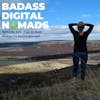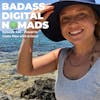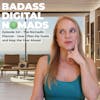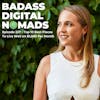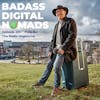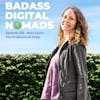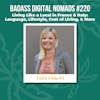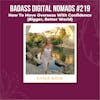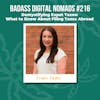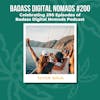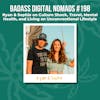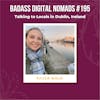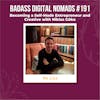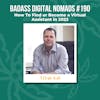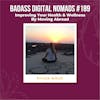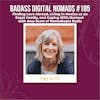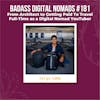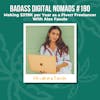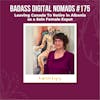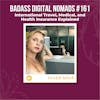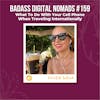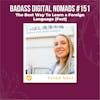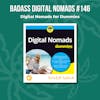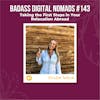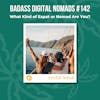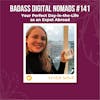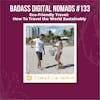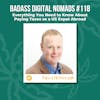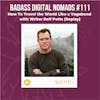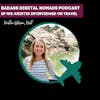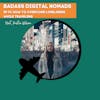Getting a 2nd Passport and Living an Expat Lifestyle With Mikkel Thorup of the Expat Money Show
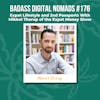
Have you ever considered getting a second passport or citizenship? Listen in as Kristin welcomes Mikkel Thorup, Host of The Expat Money Show, to explain how to get dual citizenship so you can live the expat life with more freedom and security.
Have you ever considered getting a second passport or citizenship? Listen in as Kristin welcomes Mikkel Thorup, Host of The Expat Money Show, to explain how to get dual citizenship so you can live the expat life with even more freedom, flexibility, and security.
Mikkel shares why he moved his family from Panama to Brazil, his opinions on the lifestyle and cost of living in Brazil and other countries, and how to get residency abroad by investing in real estate. He also sheds light on the real estate markets in Uruguay and Turkey and the true safety of traveling to the Middle East. Mikkel and Kristin also bust common misconceptions people have of countries not on the Friendly Nations list.
Episode 176 Special Offers:
- Apply for a Crypto.com Debit Card 💳 (Affiliate Link)
- Apply for Kristin’s Ready to Relocate program
- Order your copy of Digital Nomads for Dummies
- Reserve your FREE ticket to the Expat Money Summit 2022
- Subscribe to Kristin's weekly newsletter
EPISODE 176 TOPICS DISCUSSED/WHAT YOU’LL LEARN:
- The benefits of getting a second passport/having multiple passports.
- How to get a second citizenship or residency by investment.
- Nicaragua’s residency program explained.
- Why Mikkel and his wife chose to get a passport in Brazil and deliver their second child there via birth tourism.
- Panama changing the Friendly Nations Visa: good or bad?
- The safest countries to travel to in the Middle East.
- What you can expect to learn in the upcoming Expat Money Summit 2022.
- How Mikkel helps people invest in other countries and reduce their tax burden.
- Traveling to Uruguay for Mikkel’s one-week Expat Exploration & Investment Tour.
QUESTIONS ANSWERED:
- Why did you choose to deliver your baby in Brazil?
- What attracts people to live in Florianópolis, Brazil?
- What are the most popular places people are getting Golden Visas for?
- How is Northern Cyprus different from Southern Cyprus?
- How safe is it to travel to the Middle East?
- Why and where are you investing in real estate in Istanbul, Turkey?
- How much does real estate cost in Uruguay?
- Are you and your family going to move from Panama to Brazil in the future?
- And more!
RESOURCES
Related Podcasts:
- Badass Digital Nomads Ep. 70: How to Be a Digital Nomad with Mikkel Thorup
- Paying US Taxes as an Expat Abroad – What You Need To Know
- Moving Overseas with 3 Kids and Investing in Real Estate Abroad (Founders of Greenback Tax Services)
- How to Move Abroad (with No Job or Money) with Expats Everywhere
Related Videos:
- Watch Kristin’s Most Recent Live Stream Q&A
- My Favorite Places in the World ❤️🌍
- How to Renounce Your US Citizenship 🦅 (and Move to Canada) 🇨🇦
- Why I'll NEVER Renounce My US Citizenship 🇺🇸
Recommended Resources for Digital Nomads:
- Insurance: SafetyWing
Travel Destinations Mentioned:
- Florianópolis, Santa Caterina, Brazil
- Istanbul, Turkey
- Cappadocia, Turkey
- Galataport, Turkey
- Cyprus
- Panama
- Beirut, Lebanon
- Abu Dhabi, UAE
- Dubai, UAE
- Punta del Este, Uruguay
- Montevideo, Uruguay
- Colonia, Uruguay
Connect with Mikkel:
- Visit his website
- Listen to The Expat Money Show
- Subscribe to Expat Money on YouTube
...........................................................................................
Connect with Kristin:
- Follow on Instagram
- Subscribe to Traveling with Kristin on YouTube
- Join the Badass Digital Nomads Facebook Group
...........................................................................................
Support the Badass Digital Nomads Podcast:
- Buy Kristin a Coffee
- Become a Patron
- Leave a 5-Star Review
- Buy Official Merch
- www.badassdigitalnomads.com
A special thank you to Kristin's Patrons!
Become a Patron for $5/month at Patreon.com/travelingwithkristin
Podcast descriptions may contain affiliate links of products and services we use and recommend at no additional cost to you.
Crypto.com
Kristin: 00:00:00 Crypto.com is the world's fastest-growing crypto app that lets you buy crypto at the true cost. With Crypto.com, you can buy and sell 250 plus cryptocurrencies with a bank transfer or by using your credit or debit card. Crypto.com also offers a range of premium debit cards that give you up to 5% back with no annual fees. Open an account today using our referral code: travel to qualify for up to $25 in rewards and a 10% rebate on trading fees. You can also sign up using our affiliate link in the show notes, or go to crypto.com/app/travel. That's crypto.com/app/travel.
Introduction: Welcome to Badass Digital Nomads, where we're pushing the boundaries of remote work and travel, all while staying grounded with a little bit of old school philosophy, self-development, and business advice from our guests.
Kristin Wilson, Host:: 00:01:13 Hey there, Kristin, from Traveling with Kristin here and welcome to episode 176 of Badass Digital Nomads. My guest today is a return guest by the name of Mikkel Thorup, who you may know as the host of the Expat Money Show. Mikkel was last on the podcast more than 100 episodes and two years ago, so I was very happy to have him back on the show. You can listen to our previous interview that I will link directly to in the show notes, or by going to badassdigitalnomads.com. In today's conversation, we are shooting the breeze and catching up about everything that has happened in the past two years, why he moved from Panama to Brazil, what his thoughts are on the cost of living there, and the lifestyle as well as real estate markets in Uruguay, Turkey, and beyond. We're also talking a lot about getting second passports, second residency, second citizenships, raising a family in different countries and also what you can expect to learn in the upcoming Expat Money Summit. Mikkel has been to more than 100 countries, so it was great to have him back on the show, get more of his travel investing and living abroad tips and I hope you enjoy.
Podcast Interview:
Kristin: Everyone welcome back to Badass Digital Nomads. We have a very esteemed return guest today in the form of Mikkel Thorup from the Expat Money Show. Round of applause. Welcome back Mikkel!
Mikkel: 00:02:51 <laugh>. Thank you very much. You know, I couldn't believe it has been so long since you and I talked, I mean we were just chatting a minute ago and you said it's been been two years. That's wild. I can't believe how fast time flies.
Kristin: 00:03:03 I can't either. I mean I literally had to check back and see when was the last time and yeah, it's been about two years so it feels like it was last year though.
Mikkel: 00:03:12 I feel like that as well. But I mean at the same time there's been so much that's happened, so I'm kind of excited to chat with you today and and share some of the things that I've been up to. So it should be good.
Kristin: 00:03:22 Yes, that was actually my first question for you is what has happened in the past two years since we last spoke? Now you were in Panama last time and it looks like you were in Panama again, however a lot has happened in between.
Mikkel: 00:03:36 Yeah, so I would say the number one biggest thing is my wife and I had another child, so we did it in uh, standard digital nomad fashion. We did birth tourism, we flew down to Brazil and we gave birth to our son in Florianópolis in Brazil. So now we have a little Brazilian baby at home and because we are the legal guardians of a Brazilian citizen, we get our family reunification visa and can get our permanent residency there with a fast track to citizenship. So that's kind of one of the really big things in our family.
Kristin: 00:04:11 Amazing. Well congratulations.
Mikkel: Thank you.
Kristin: On the new addition to your family, I do think that your wife was pregnant perhaps last time we talked because I vaguely remember talking about going to Brazil. So was that part of the plan, the birth tourism?
Mikkel: 00:04:27 So my son is 14, 15 months old, so yeah, I think that kind of lines up with maybe if she was just pregnant around the two year mark.
Kristin: 00:04:36 Yeah. And why did you choose Brazil?
Mikkel: 00:04:39 So a couple of reasons. We chose Brazil. First of all, I've been there several times, so I really like it. I enjoy the people, I love the food. I think it's an amazing country. Second of all, because they do citizenship based on the soil. So the child will get citizenship the same as most countries in Latin America, north America, Caribbean, and things like this. And because they have this opportunity for the parents to go through a fast track, permanent residency and citizenship. And we were really pleased with the decision. We went down there, it was our first time in Florianópolis, I think it was my fifth time in Brazil. And we were there for six months and everything was wide open. This was right in the height of Covid hysteria, but everything was wide open. There was very little masking, you know, people were enjoying their lives. It was very refreshing and we met a group of doctors there, group of libertarian doctors and made friends with them and they took us to the beach like every weekend. And we were cooking Churrasco and it was just an all around great experience. I, I really liked it.
Kristin: 00:05:44 How did you meet these libertarian doctors?
Mikkel: 00:05:46 You know, it's funny. So I have a friend who I've not met in person, but you know how you somehow get connected with someone on the internet and we went back and forth on Telegram for a couple of years and he's from Brazil, not specifically from Floripa, but he said, oh, I've got some friends there and I think you'd really like them. Why don't you send him a message and say hello? So I took him up on the offer and kind of just shot them a random message and they said, sure, we're gonna go to the beach this weekend. It was the middle of winter, so it was probably like 14 degrees Celsius or something like that. So we all had winter coats on and we went to the beach and had uh, patio chairs in the sand and I think my son was probably a week old or two weeks old or something like that. So he's all bundled up and we got the little hat on him and stuff and sat down with them and they were just lovely, lovely, lovely people. And we just talked all day and we ate food and then a couple days later we saw them again and then again and then again. And now one of the guy works for me and helps me in the business and we've gone back to visit them and they've become like part of the family. It's been amazing.
Kristin: 00:06:51 Amazing. That's what I love about meeting people in different countries. Where are they from? Are they from Brazil or were they expats?
Mikkel: 00:06:59 They're all from Brazil, but none of them are from Floripa. So Florianópolis kind of attracts people from all over the country, especially freedom minded people and there's very much a digital nomad type of hotspot there. It's kind of on the trail I suppose. So there's lots of cool people coming in and out of the city.
Kristin: 00:07:20 Why do you think that is? What do you think attracts people to live there?
Mikkel: 00:07:24 Well, I mean the natural beauty of the place itself is absolutely stunning. It's a small island in Santa Catarina in the south of Brazil. The weather is amazing. There's surfing, there's very, very safe. The cost of living is more expensive, but it's still very, very affordable compared to most places in the world. Maybe in Brazil it's more expensive, but still it's a good option and it's where a lot of the wealthy people go. So there's good shopping, there's good restaurants. Like sometimes people have a bad impression of Brazil because they saw the movie City of God or something like that in the nineties and they think the whole country is favelas and gangs and it's like not the case at all. Like Brazil is an amazing place with wonderful people and and Santa Catarina and specifically Florianópolis really encompassed that a lot. I think.
Kristin: 00:08:11 Well, I'll have to check that out. Yeah, it's a massive country with so much diversity. I've only seen a tiny, tiny part of it. And why did you choose Brazil specifically to, you know, get this additional passport? Especially you have a passport in Panama or which countries do you have currently a passport in?
Mikkel: 00:08:31 Yeah, so I have passports in residencies in a few different countries. We decided to add Brazil because, well first of all because it is the fast track as I mentioned before, but it's also part of the bricks countries. So there's a lot of agreements that are happening with very different places in the world. For me, I look at diversification whenever I go down these paths. So in my mind, if I were to have a Canadian American and I don't know Costa Rican or Mexican citizenship, those are all so highly correlated. What I really want to have is residencies and citizenships in countries that are as little correlated as possible. My wife is from mainland China. We're fully set up in China, not me with citizenship, but with bank accounts. We own a couple properties there. I have a long-term visa there. We've got assets in, we even have clothes and stuff like that. I like the types of places that are completely different. We're doing a project in Turkey right now, so I'll get my citizenship in Turkey. We're buying another home there in the rise of the Ottoman Empire. That's a very different type of location than just having everything tied to Canada, for example, which is where I was born and raised.
Kristin: 00:09:42 Yeah, having like a different quote unquote strength of your passport or different types of visa free travel, I think having three or four passports covers you for pretty much anything. Well now we're all halfway through 2022 going into 2023. Has anything changed during the pandemic as far as the types of countries that you've been helping people get citizenship in or residency in?
Mikkel: 00:10:09 No, not so much change, but certainly in acceleration. I mean we were getting some people here and there and it was a lot of lifestyle things. Now there's a lot of people leaving Canada because they really don't agree with the government there. Canada used to be about 5% of my business now it's probably about 50% of my business. They don't agree with the seizing of bank accounts, they don't agree with the border controls and the way that Trudeau handled a lot of things. So now we get a lot more Canadians and they're leaving because they don't wanna support these things. So there's a lot of political reasons and personal reasons opposed to before maybe it was like retirees or people who just wanna live on the beach now, it's like a place of safety that they're really looking for.
Kristin: 00:10:53 Yeah, I've noticed that here in Miami too. <laugh>, like a lot of Canadians moving here and then a lot of US citizens moving out. It's like everyone is switching countries. So it's pretty interesting to be a part of this movement. And then what are some of the most popular places that people are getting their golden visas?
Mikkel: 00:11:14 Yeah, so Panama is still very popular, I think is also very popular with me or with my clients because they see that I'm here. And I think that in a lot of people's minds that speaks to the validity of the country or the lifestyle of the country because I've decided to base my family here. Now we have bases in other places and I always try to tell people it's, you know, it's not about finding the one perfect place. It's about mixing and matching and trying to create freedom in any way you can. So Panama's is very, very popular. Costa Rica, which you know extraordinarily well is still very, very popular. Mexico obviously because of the ease of getting getting there from the United States and being able to cross the borders, you know, we don't do a lot of Belize anymore. That's really slowed down. Nicaragua is coming up. More and more people who never would've considered Nicaragua are now have it at the forefront of what they're planning. They have a couple of new residency programs there, so it makes it very easy to go through that. And then the standards, you know Portugal, you know some of the other countries in southern Europe, Greece is coming up a lot with their golden visa program and their real estate options and we're doing some of those as well. But certainly Central America is the center I would say.
Kristin: 00:12:28 I wasn't aware that Nicaragua had any new programs. What are the details there?
Mikkel: 00:12:33 Yeah, so it's not necessarily a new program, but it is a clarification on the time in country that is needed. So for $35,000 you can get a residency there. Now you have to check in with immigration every six months. And from what the lawyers have told me is if you can double that amount, basically bring it up to about 75 or $80,000, then you only need to check in with immigration one day or once every 12 months. Where before you really needed to spend an extended amount of time in the country. Now they're really moving away as well from primary residents or from having a home that would get rented out and it's more into businesses or commercial real estate or agricultural land or timber or these types of additional things that will actually provide work for people. So we see a lot more people getting Nicaragua as a backup residency where before Panama would be the backup residency on what was called the Friendly Nations visa, which was only a $5,000 bank deposit up until August 6th of last year. Now Panama's moved to $200,000 for a real estate investment. That's pretty serious. So people are looking, what are the other cheap options? 35 grand. It's not nothing, but it's not
Kristin: 00:13:49 Six Figures
Mikkel: 00:13:49 Exactly. It's not six figures or mid six figures like some of the European countries. So it's accessible by more people, you could say.
Kristin: 00:13:56 Yeah, there's quite a difference between like 35,000 and 350,000 euro for example.
Mikkel: 00:14:02 Exactly.
Kristin: 00:14:03 What are your thoughts on Panama changing the Friendly Nation's visa? Do you think it was short-sighted? Do you think it was something that was necessary validated?
Mikkel: 00:14:13 No, I think that it makes perfect sense because the way that they had set up the visa in the first place was that you were gonna open a corporate structure. So a Panama essai and a bank account. And the idea was you would come down here and you would build a business and you would participate in economic activities. But what most people did was just get it as a residency in their back pocket, put the $5,000 in the bank account and four weeks later remove every penny of it or every penny but except $5, keep it open and then have the residency and visit one day every two years. So I think the government finally went, okay, well this is not working. You know, we're trying to drive the economy and bring more money in and have people move here and build businesses. So they've moved it to the real estate.
Mikkel: 00:14:57 Now a lot of people would've thought that this just absolutely would kill people wanting to come to Panama. But I think besides a small lull or a dip right after August 6th when this happened, I think it's going just as fast, just as many people applying as before, at least before the announcement was made that it was going to change. You also have the qualified investor program and some other visas there that are getting record numbers of people. And the main differences between those is with the Friendly Nations you have to be from one of 50 countries or 51 countries, they modified it. And the other one is it's a higher dollar amount but can be from anywhere in the world. So if you're from India or Pakistan or wherever, maybe you're not part of the Friendly Nations, these top 50 countries, but you still want to come here to Panama, then there's an option for you for that. So I wouldn't say it's shortsighted. I personally see that it makes a lot of sense why they did this and in the long run I don't think it will dampen people's enthusiasm for Panama at all.
Kristin: 00:15:59 Mm-hmm <affirmative>. Yeah, I kind of disagree with the whole concept of Friendly Nations. I think that's becoming outdated. Definitely. So I'm glad to see that it's opening up to people of any country because I think that is a bit of an antiquated perspective that many different governments have of like people with this passport can come in and people from this nationality can apply easier to live here.
Mikkel: 00:16:21 Yeah. And it makes no sense when you punish an individual based on something that the government does. Like that doesn't make any sense. Yeah. You know, it's happening all the time in the Middle East and in some of these countries they have a bad reputation. Well it might not be that individual, like I don't believe in communal guilt, you know, because you're born in a country then suddenly you're a bad person. You've traveled all over the world, I've traveled all over the world, there's good people everywhere. There's amazing, amazing human beings on every corner of the earth. And if they wanna make something of their life and they want to you know, step up and make a change, then the opportunities should certainly be there.
Kristin: 00:16:58 Yeah, I think that there have been a lot of countries that were kind of underrated as far as they were out of the limelight of the mainstream media and maybe they didn't get as big of a section in the history books of other countries, especially western countries. And I think we saw this with Ukraine, like all of the support for Ukraine since the Russian invasion. I believe that the people of Ukraine are extremely strong and diverse and everything that they're going through is horrific. And there's been so many stories of individual strength and heroism and everything. But then from traveling so much I see that reflected in, I think any country that I've ever been to is you see, okay, maybe most people didn't think about Ukraine as often before and they didn't realize how talented the people were and how advanced they were technologically and all of the different attributes of the citizens of that country.
Kristin: 00:17:58 And I kind of see that in every country. And so it almost seems like the way that the governments have made it like a good versus evil and like countries have been pitted against each other because of the decisions of the leaders of those countries that don't necessarily reflect the citizens in the US for example, like the US media might pick a country in the Middle East as being like the quote unquote bad guy like let's say Syria <laugh> for example. But then there's so many immigrants from Syria that were doing amazing things. The point is that there are very talented people from every country. There are very good people from every country. And it seems so antiquated to like classify or categorize an entire nation of people because of the policies of the government that's temporarily in place at this point in time.
Mikkel: 00:18:52 Yeah, I really find that with Iran. You know, I went to Iran probably 10 years ago and met the most gentle, loving, amazing individuals when I was in that country. And it's been branded the access of evil <laugh>. And you know, it's like my father like called me before I went and he's like, what are you trying to do? Who are you trying to prove something to? Like what is this? They're gonna kidnap you. And I'm like, what are you talking about Iran? Like no, I mean that's not gonna happen. Everything will be fine. And I had a great trip while I was there and it was just, it was such a good experience. I just got back from Lebanon seven, eight days ago, something like that. And it was the same type of thing. I mean they've had some really troubled past, but I met some of the most amazing people while I was there.
Mikkel: 00:19:39 And you know, I had a guide who drove me around and we talked for six, eight hours a day about anything and everything in the world in geopolitics and economics and like really in-depth conversations. And he was so smart and I was just like, this guy is my brother. Like <laugh>, like I gave him such a big hug when I left. Like I was so thrilled to meet him. And Lebanon has a really bad reputation in the world right now and it's such a shame and he can't get out, he can't go anywhere else, he can't immigrate anywhere or build a better life and you know, highly educated, very smart guy and he's working as a tour guide. It's a shame. It really is.
Kristin: 00:20:17 Yeah, actually I just got back from Istanbul a couple days ago.
Mikkel: 00:20:21 Oh me too. <laugh>.
Kristin: 00:20:23 Yeah, we need to talk about Turkey.
Mikkel: 00:20:24 That's so wild. Yeah,
Kristin: 00:20:26 Yeah. And I kind of got the same thing, like people are like, oh are you afraid to go there? Like is it dangerous? I'm like, why? Because of the general location of the country, are we just gonna like put a blanket stereotype over an entire region of the world? And of, I wasn't scared to go there of course, but then like once I got there and was just starting to meet people, like people from other countries met some of the locals and I really was only there for less than a week. So it wasn't long enough at all. But I met so many amazing people just in those few days and it really motivated me to become nomadic again and like get back out there and start traveling again and living abroad because I just met so many cool people in like five days compared to, I've been in Miami for two and a half years now and haven't, you know, met as many people in that short of a span of time.
Kristin: 00:21:17 And on the last day we went on a boat tour of the Bosporus all day long and after the tour I was hungry so I was asking the tour guide like, where can I get the best Baklava cuz I was leaving that night and I was like, I can't leave without having some Baklava. And he's like, oh actually it's across the street from the port. And he's like, I'm gonna go get some anyway because the traffic is really bad right now. It was rush hour, it was like 6:00 PM He's like, I'm gonna wait for the traffic to go down. So we both walk across the street and we like bought all of these different types of Baklava and Börek, like the pastries with cheese and meat and everything. And that was basically what I had for dinner. But we just sat there for an hour chatting about everything and he talked about like the other countries he's lived in throughout Europe and how he was depressed because he was working in this office in Krakoff in Poland.
Kristin: 00:22:14 And that led to him to have more of like a party lifestyle where he was living for the weekends and like drinking too much and all of that stuff. And how he had like this experience that then changed his life like where he ended up in the hospital. And he decided to quit his job, quit partying and move back to Turkey and that's when he got the idea to start his own business. I think he's the top rated guide on Airbnb experiences and all of Istanbul. And yeah, we just like dove straight in. We actually had the same birthday so we were having Baklava the day or so after our birthdays and there were all these like synchronicities and things and I was like, yeah, you know, this was some person I had never met before this day and now I have like learned his life story and we were just sitting there chatting and drinking Turkish tea and it was so beautiful. It was just like a normal afternoon. But to be able to connect with somebody that I would never have met if I hadn't have traveled halfway across the world and just having like a human interaction with someone from a country that like some people in the US would expect me to be afraid to go to. Like that's the thing that really annoys me. I think about the media portrayal of entire countries of people based on their governor.
Mikkel: 00:23:38 Absolutely. I resonate with that very, very much. Now did you go to Turkey just for one week? Was that the whole trip or were you going other places as well?
Kristin: 00:23:49 Yeah, it was just a, an ambassador trip with Safety Wing, the Nomad Insurance Company, well they actually do a lot of different things. They have health insurance, travel insurance, they're building the first country on the internet, they're building a pension plan for global citizens. Like they're doing a lot of cool stuff. So I just went with them and it just happened to be my birthday and so yeah, it was just a good opportunity to go overseas but I wasn't prepared to stay over there. So it was actually really interesting that everyone that I met, instead of asking them like, where are you from? You just assume that everybody is either living in another country or they're nomadic. So you ask people like, oh where are you based? Or are you nomadic? It was just like a total twist on what you would normally ask people, like where are you from or where do you live? It was more like, are you nomadic or not? and learning where everybody was going. So yeah, it was just a quick trip to Istanbul but definitely would like to go back and see more of the country because it is massive. So yeah, I'm excited to hear what brought you there and if you've been there before and all of your years of living over there.
Mikkel: 00:25:03 Yeah, so this is my fourth time in Turkey. Mostly I go to Istanbul but I have been to Cappadocia and a couple of other places. This trip was just to Istanbul. So I had meetings in Istanbul for a couple of days and things to do with the citizenship by investment. So for people who don't know, for a $400,000 real estate investment in the country, you can actually get citizenship. Takes about six or seven months. The real estate doesn't have to be a government approved projects who can actually be anywhere in the city or or really anywhere in the country. And yeah, you can get these amazing heritage homes that are a hundred years old and have them renovated and fixed up and turn 'em into Airbnbs or live there yourself or whatever you want and you get your, your citizenship. So I had a bunch of meetings there for that. And then I was in Rome for a week. I'm part of a, a high-end mastermind with other business owners. So I was in Rome for a week with them for a meeting and then I was in Cyprus for five days and North Cyprus, Turkish controlled northern cpria. That was interesting. I've not done that. I dunno if you've been before.
Kristin: 00:26:12 I've been to the Greek side.
Mikkel: 00:26:13 Yeah. So you have the cypriot side, the normal Cyprus side, but then there's a demilitarized zone and you use your passport and you show it to leave that part. Then you walk about 10 meters, 20 meters, something like that. And then you show your passport again and you enter Northern Cyprus. It is a new country but it's not a new country because it's only recognized by Turkey and by themselves. And yeah, it's, there's a whole bunch of politics there that I'm not gonna get into and, and honestly I don't really understand all the dynamics of it. It's its own story.
Kristin: 00:26:47 I don't either. Yeah, I asked when I was there but it, yeah, it's a complex topic.
Mikkel: 00:26:53 Yeah, I tried to learn as much as I could but there's a lot of history there, you know, it's not my speciality for sure. But I went there to see and to make an informed decision, you know, on what the country is like and see if it's a good place for expats. And we do a lot of our structuring with a company based out of Cyprus for setting up Cypria companies and companies in other parts of the world. So I had meetings with them there. And then like I was saying earlier, I went to Lebanon for a few days and that was just pure vacation. I wanted to go somewhere I've never been before and see something new. So Lebanon, there was no official reason for being there, but it was still a lot of fun.
Kristin: 00:27:28 Did you go to Beirut?
Mikkel: 00:27:29 Yeah, correct. Beirut.
Kristin: 00:27:31 Yeah, I would really would like to go there. My ex-boyfriend, his family's from there. And so yeah, I got to see a lot of photos and videos and learn about the food. Looks like amazing food there and yeah, beautiful place.
Mikkel: 00:27:46 Yeah. And they have Roman ruins and they have ruins that pre-date Roman architecture and things like that. They have things that go back 6,000 years or 5,000 years and stuff like that. Cities built on cities built on cities and it's just like layers and every time they dig down they find a new city. I think one of the communities or one of the towns there dates back 8,000 years. And there was another one we went to, it was fish fossils. I never thought of a fossil of a fish, but these are a hundred million year old fossils that you can actually purchase. They come with a certificate, they've been shown in National Geographics and everything like that. So I bought a fossil for a few hundred dollars of this fish.
Kristin: 00:28:30 How big is it?
Mikkel: 00:28:32 They have some that are huge, like a meter across. But the one that I bought was, I don't know, maybe a foot across or something like that. And it's just so wild and it's like the highest concentration of fish fossils anywhere in the world and you can go and look it up. There's been news reports on it and stuff like that. I'm a total history geek and I, I love all these kinds of things. So it was really cool for me to be able to see something like that and, and I was like, are you sure it's allowed to buy this right <laugh>, am I allowed to take this outta the country? Like I'm not gonna get stopped at the airport. No, it's fine. And you have all the documentation and everything and I guess there's just so many of them that it's okay. I don't know.
Kristin: 00:29:09 This is in Lebanon?
Mikkel: 00:29:11 Yeah, this was in Lebanon. Yeah.
Kristin: 00:29:12 And so did you put it like up on a stand or on your wall or something?
Mikkel: 00:29:17 Yeah, right now I have it hidden away cuz I'm afraid my kids will wanna play with it or something and knock it off the stand so it's, it's laying very flat and very well protected and I will be the custodian of this and I will, I will pass it on to my kids one day. I'll protect that.
Kristin: 00:29:32 That's really cool. Yeah, definitely. It's a reminder of how much things change. You know, when they're finding fossils in areas that are deserts or mountains, it's like wow, this used to be underwater or fish fossils basically.
Hey there, Kristin here. Did you know that I have a weekly newsletter? You can stay in touch and receive an email from me every Friday by going to travelingwithkristin.com/subscribe. You'll be the first to know about new projects, videos, and opportunities for attending meetups live streams and more. You'll also get a lot of travel and remote work tips, insights, and thoughts that I don't share anywhere else. Sign up today at travelingwithkristin.com/subscribe. And now back to the show.
Kristin: What was your perception of the northern side of Cyprus versus the southern? Does it all look the same or does it feel like palpably different, like you're in a different culture?
Mikkel: 00:30:35 Very different because you can really think of one side as a Christian side and the other side as a Muslim side. So as soon as you cross the border the architecture changes. Now, while I was in the northern side or while I was in Cyprus in general it was Eid so it was holiday time. So there was, most of the things were closed. Unfortunately all the shops, there weren't many people on the streets. But I went to like a little souk and a bazaar type of thing and wandered around and uh, I went to see the mosque and stuff like that. So I enjoyed it. I mean I lived in the Middle East for eight years and I think that that history and culture is very fascinating. So I like going to a lot of those different types of countries. I think I've been to most countries in the region, but it's always interesting to see the differences there.
Kristin: 00:31:21 Yeah, I found Istanbul to be quite unique because it's secular and religious. I think sometimes people have a perception that every country is very religious, but in the Middle East they're all so different. Although I haven't visited most of them yet. But it was interesting to see people from all over the world on the same street corner or in the same restaurant and you had women wearing burkas, women wearing mini skirts and like bikini tops and high heels and all different languages.
Mikkel: 00:31:57 Yeah, you get like the Russian women over there and stuff and it's like, oh my god, I can't believe you're wearing that right now. Like this is a Muslim country for me, I was surprised by some of these types of things cuz I've spent a lot of time in the the GCC country, so at the Gulf State where you really wouldn't see that type of thing. But it was cool to see people from every corner of planet earth in Istanbul in this melting pot as they say. And it's so cool with Turkish airlines cuz I, I don't know if it's more cities than anywhere else, or more countries than anywhere else, but it's a huge airline and they go so many places. So that's really, really connected as a hub.
Kristin: 00:32:34 Yeah, I think it was maybe more than 400 cities or something like that cuz I flew Turkish Airlines direct.
Mikkel: 00:32:41 Just wild.
Kristin: 00:32:42 Yeah. And in other areas in that region have you found as much security? Because I felt like any public place that I went into, you would have to walk through a metal detector and there would literally be a security guard at the door of restaurants, hotels, et cetera. And then to get to the airport, which apparently the airport is new, the one that I was at. So that's over about an hour from the center of the city and there's a security checkpoint to get into the property that the airport is on where they're checking your car, they're checking the trunk, they're checking your bags, and that's just to enter the airport from the highway. And then there's another checkpoint to get into the terminal where the ticketing area is. And then there's another checkpoint, which is the regular security checkpoint that every airport has and then there's extra security checkpoints at each gate. So I felt very secure there. Is this something that is the norm?
Mikkel: 00:33:41 No, I wouldn't say it is the norm. I think that there are different countries like in Abu Dhabi and Dubai, it's so extraordinarily safe there. I'd probably put those as some of the safest places on planet Earth. I think the country in general is so safe. So they don't have all of these types of security checkpoints that make it safe, if that makes sense. I have a funny story about entering Turkish airport or is the airport in Istanbul. And it wasn't from this trip, but it was from probably seven or eight years ago. So I was there with my buddy Adam and it was our first time there and we decided we wanted to get some souvenirs. So my father really likes antiques. So while we were in the bazaar, I found this old wooden Turkish musket. Okay. It was like a hundred years old or 120 years old.
Mikkel: 00:34:29 It was wooden and the metal was all rusted. The thing was like almost falling apart really. It was a musket, but we wrapped it in some newspaper and put it in a bag and stuck it in the suitcase. And you know, I totally forgot about it. It was in the first day or two of being in the country and we were there for a week or so. And when I went to the airport to go back to Abu Dhabi where I was living at the time, and we went through one of those security checkpoints, just like you mentioned, they scan your bag to enter the airport. So my bag goes through and suddenly all these guys are waving their arms and everyone's going crazy and five other security guards or police officers run up and there's like 7, 8, 9 guys around, like pretty big guys. Like I'm not a big guy by any stretch of the imagination, you know? So I'm kind of freaking out and they're all yelling in Turkish and stuff and I'm like, what's going on? They're like, open your bag, open your bag. And so I open it up and there's this handgun. Yeah, like this antique busted half rotten falling party
Kristin: 00:35:28 Musket from the 18 hundreds <laugh> <laugh>.
Mikkel: 00:35:32 And they look at it and they're like, they're just start laughing like, like they literally thought like someone was bringing a gun into the middle of the airport and so they just packed it up and then they just let me through it. It was completely ridiculous. But that story just popped into my mind when you mentioned all the security there. Oh god, it's too funny.
Kristin: 00:35:48 I still don't think you'd be able to bring that through in the US. Yeah, maybe not. Like this is the literal gun.
Mikkel: 00:35:53 I think they take nail clippers off you or something in the states. So <laugh>,
Kristin: 00:35:58 I try to travel green. So I have my reusable bamboo fork knife in the spoon. <laugh>. Wow. They took my bamboo knife <laugh>. I'm like, it's a wooden butter knife, like I'm not gonna do anything with, I didn't argue with them. I was just like, okay. She was like, really? You're gonna bring a knife through security? I'm like, it's not really a knife, like it's a piece of wood, but I get it. Like I'm just gonna let you throw it away. <laugh>, you don't wanna argue with any security guards
Mikkel: 00:36:29 Anywhere. Yeah, especially with TSA. No they're not no one for their compassion by any means.
Kristin: 00:36:34 Or sense of humor, <laugh> nor should they be. So yeah, I was thinking a little bit with all the security checkpoints, like to go onto the boardwalk in Galataport or anywhere. I was like, should we be nervous that there's so many metal detectors everywhere? But I don't know, I hadn't heard anything otherwise I, it just seemed to be like a preventative measure, which sad to say, but maybe we need that in the US everywhere to go into public places apparently because of the issues we have here. And why did you and your wife decide to invest in real estate in Turkey? Do you just wanna have another home base there or is it more just for the investment?
Mikkel: 00:37:16 The investment itself plays a part in it, but one of the main reasons is I speak on stage quite a bit and in Europe I get invited to speak on stage. I have a lot of meetings there and things like that. Now we do have a direct flight from Panama City to Istanbul. It's 13, 13 and a half hours, something like that. And doing it once for a trip like this to go for three, four weeks is okay. But next month I'm supposed to go back and the month after that and the month after that. So for me it's actually easier to have a base there than spend my summers in Turkey and then bring my wife and my mother and the kids and our nanny and everything, everybody over there and have a home base. And then when I need to go to Germany or Rome again or these different places, then it's just an hour, two hour flight.
Mikkel: 00:38:03 I pop back and I'm with my kids for a week and then I pop out again a couple of hours, do another speaking conference or a meeting or something like that and then come back instead of having to go all the way from Panama or leaving my kids in Panama and being separated. That was really tough for me to be away from them for three weeks. Normally I try to bring my kids with me or we'd make them really short trips. You know, we were in Peru five weeks ago, six weeks ago, something like that. Me and my wife went away, it was a week and that was it. You know, that's not so bad but three weeks, four weeks, it's too much for me. Way too much.
Kristin: 00:38:39 Yeah. That's a long time. Istanbul is massive. I think they were saying there's 20 million people there now. Yeah. And it's growing by the day. Have you chosen an area of the city yet to invest in?
Mikkel: 00:38:51 I looked at some properties while I was there. We haven't narrowed it down to a neighborhood yet, but I'm pretty sure we'll be on the European side. I think that the Asian side is amazing and you'll probably have a much better cultural experience, but I'm over there because I've got meetings and there's so many other expats there and clients that are coming through. That's kind of the traveler's place where everybody kind of concentrates. If I was gonna live there full-time, 365 days a year, I'd probably be on the Asian side and try to have more of a quote unquote Turkish experience you could say.
Kristin: 00:39:27 Yeah. I didn't make it to the Asian side, but I did meet some people that were staying over there and they said it's quieter <laugh>, it's more suburban. Like more neighborhoods, more families and like less touristy, less of the business district. Yeah. But in Istanbul you wanna be central because the traffic is so bad. So the closer you are to whatever it is that you're doing, the better. I began boycotting getting in the car on like day three. I was like, wherever I'm going I will be walking or I will be skipping that excursion or I'll be taking public transportation because yeah, I was just spending so much of my time in the car. That's not fun.
Mikkel: 00:40:09 What dates were you there? I'm so curious if we were there at the same time.
Kristin: 00:40:13 I think that was the 18th to the 24th
Mikkel: 00:40:14 of July or of June?
Kristin: 00:40:17 Of July.
Mikkel: 00:40:19 Yeah, I think I was just leaving the day that you were arriving then.
Kristin: 00:40:24 Oh,
Mikkel: 00:40:25 Maybe we saw each other. We could have waved in the airport.
Kristin: 00:40:28 I Know,
Mikkel: 00:40:28 I think I left on the 17th so
Kristin: 00:40:31 Well we'll have to meet in person somewhere.
Mikkel: 00:40:33 Definitely.
Kristin: 00:40:34 Tell us a bit about this conference that you're doing, the Expat Money Summit. Is that in person or is it virtual?
Mikkel: 00:40:40 So what we're doing is a virtual only conference. Hopefully next year we'll start doing in-person conferences, but this year is virtual only. If you guys go to expatmoneysummit.com, you can get a ticket. All the tickets are free technically we do have a VIP ticket, which is a paid one, which comes with a ton of other bonuses. But for all intensive purposes you can get a free ticket, you can see every one of the presentations. We've got some amazing speakers there. We've got Congressman Ron Paul is speaking at the event. We've got my friend Doug Casey. There's lots of really good people and the idea is to help people have more freedom in their life. And for me the best vehicle of that is traveling and living overseas and having bases in different countries and residencies and citizenships and things like that. So if these types of things interest you, then definitely come and grab a free ticket at expatmoneysummit.com. And what we're working on is having 30,000 attendees. So it's gonna be a huge event. Probably the biggest event in this space for the entire year. And yeah, I'm really excited about it. It's a ton of work but it's gonna be really, really good.
Kristin: 00:41:47 Yeah, That is a lot. And that's in November, correct?
Mikkel: 00:41:49 November 7th to 11th. But you can pick up your tickets now for free and then you'll be able to watch all the presentations when they go live.
Kristin: 00:41:59 Okay, amazing. Well I think everyone wants a little bit more freedom in their lives, so can't go wrong there. And then when talking about having this freedom and diversification of living in other countries, increasing your freedom and your wealth, can you speak a little bit to what you help people do as far as the combination of investing in other countries and at the same time reducing their tax burden? How do those things fit together in like the big picture of what you're helping people do?
Mikkel: 00:42:36 Yeah, so I work mostly with high net worth individuals. I work as a consultant helping people relocate. You know, I'm not a lawyer, I'm not an accountant, I don't play one on television. I work with all of the lawyers and the accountants. So everything that we do, we have them sign off on everything. When we're looking at residencies, we try to do it through a program like Turkey where you can actually have a viable option for the real estate and instead of like overinflated, puffed up type of real estate, which is not a great deal by any means, I deal with a lot of families. So we deal with their schooling issues, you know, for if they have young kids, you know, a lot of the tax issues, Americans and Canadians, as I was saying earlier, a lot more Canadians are going through this. Technically I can help people from all over the world, but a lot are Americans and Canadians.
Kristin: 00:43:26 And are people ending up with multiple passports or properties and other countries or is there any kind of ideal outcome that people are striving for? From the people that you've talked to and that you've worked with? Is it mostly people that just want the flexibility of another passport or are they purchasing real estate to live in another country or to just invest to protect their wealth in other places? Or is it a combination?
Mikkel: 00:43:56 Yeah, most of my people fall into two buckets. So it's either they're done with Canada, done with the states, they wanna move overseas and we're moving their wealth, their business, their banking, the structure, their residency, their tax home, everything overseas. So that's kind of bucket number one. And bucket number two are the people who want a plan B. So it's like they want to have all this stuff but they don't wanna actuate the plan yet. And if things get worse in their home country, then they want to have it in place and then it kind of allows them to sleep sounder at night, you know, not have to worry about it. If things get worse, they just jump on an airplane, they grab their bag and they have a legal place they can go. They have a home that's there, they have a bank account with money waiting for them. Everything is already done. So it kind of falls between those two buckets for most of my people.
Kristin: 00:44:45 Okay, interesting. And you said that you spent some extra time in Uruguay this year or in the past two years. Was this when you were in Brazil or when was that?
Mikkel: 00:44:57 No, so actually we went to Uruguay in March I wanna say of this year. So what happened was I had a couple of my clients who were asking questions about Uruguay. So I got a professional referral to a law firm down there and started taking phone calls with the law firm, met their head of the tax department, head of immigration, head of the structuring, their investment, CEO, everything like that. 5, 6, 7 calls, hour, hour and a half. Really got to know the country quite a bit from a legal and theoretical type of standpoint. Then they sent their CEO up to Panama and spent a half a day with him, built the relationship, things were very good so he invited us down to Uruguay to come and check out the country. So my wife and I flew down for a week and breakfast, lunch and dinner, spent time with the people there on the ground, met everyone involved, drove around, saw the investments, the real estate visit, the law firm, everything like that.
Mikkel: 00:45:53 Yeah, had a very good impression of the place. So I like to do this level of due diligence with anybody that I work with. And so what we're actually doing in October is I'm taking a small group of 20 of my private clients and taking them down to Uruguay for a group trip. I named it Expat Exploration and Investors Tour. So I'm bringing down a group of 20 high net worth individuals. We go and take a look at all of the real estate, we open the bank accounts, we do the residency, all of these types of things. And it's really neat because I know all the people and they've come for events here in Panama or I've met them at conferences in person and I've worked with them. So now everybody gets to spend time together cause I'm really all about community and I like connecting people. So I'm really excited about this second trip to year where I think it's gonna be amazing.
Kristin: 00:46:42 Were you in Punta del Este or which area?
Mikkel: 00:46:45 Yeah, so we were in Montevideo and then we went to Colonia and then we went to Punta del Este and Punta del Este is amazing. So beautiful there.
Kristin: 00:46:52 I should have gone when I was in Argentina, but next time. Yeah. And what are some of the general real estate prices that you saw there? Like let's say one or two bedroom condo?
Mikkel: 00:47:05 Yeah, so they had the whole gambit. Like you have to understand that Uruguay is not a developing country in any stretch of the imagination. You can kind of put the prices on par with the US or with Canada. We went and looked at normal condos. Two bedroom we're probably at around the $200, $250,000 mark. But we saw brand new builds on the beach. You know, four bedroom condos at a million and a half, 2 million that have their own chef that comes in and cooks for you every day and made service on site that's part of your condo fees or your HOA fees. We went and visited the farmland, which is huge there and visited farms that were four or 5 million but a thousand acres or 500 acres of equitable land and cattles and cattle herds. And it's like they really have anything and everything that you would expect there, but it's not like wanting to move to Honduras or something like that where you're gonna get real estate at bargain basement prices. Uruguay's
Kristin: 00:48:04 or Nicaragua
Mikkel: 00:48:05 Yeah, or Nicaragua. Exactly. It's not that type of a play.
Kristin: 00:48:09 And is the citizenship or residency by investment, is that through real estate investment? Is that the path?
Mikkel: 00:48:16 So actually they don't have a real estate by investment. What they have is an immigration process, but you need to show a certain amount of time in the country or really a strong tie to the country. So if you wanna immigrate there, then you're gonna need to spend 183 days there, which would make you a tax resident. Now you just pay the legal fees, which are a few thousand dollars, but there's no real estate or uh, investment component. However, if you do happen to buy a business or a larger property, then immigration, from my understanding or in my conversations with the lawyers, will take that as your strong ties to the country and reduce the amount of time that you need to spend there. So it can actually drop to only a couple of months, which is very attractive. But even if you do become a tax resident there, they have a 10-year tax holiday kind of similar to the non dom system in Portugal.
Mikkel: 00:49:04 So there's some pretty good options there. But I think that the main thing to keep in mind with Uruguay is not really like a residency in your back pocket on a plan B. This is a place where you can move to, to have a viable life in a safe country, which is developed and educated smart people. And you know, a country that has really balanced and stable that doesn't have wild inflation, that there's not massive amounts of corruption or anything like that. Like it's, I would put it as the most stable country in Latin America.
Kristin: 00:49:37 Hmm. So people that are going there on this tour, they're more looking at investing there more as possible home base to have the quality of life that's there and also own a property versus rent.
Mikkel: 00:49:51 Yeah, that or purchasing agricultural land and having it managed by a farm management company and using it as an income producing asset.
Kristin: 00:50:01 Mm-hmm <affirmative>. And did you happen to catch the rental prices there?
Mikkel: 00:50:06 Not that I could remember. It's probably in my notes somewhere, but off the top of my head I'm not sure what the rental rates were.
Kristin: 00:50:12 Yeah, I'm just curious because the prices sound similar to Costa Rica and it kind of comes to this turning point, so to speak, or decision point where you decide, okay, like if I'm gonna live here long-term full-time, then maybe you wanna invest in real estate, but it doesn't seem like a good place to do like a hands-off investment. Sure. Because you're gonna have to be there anyway if you wanna get that residency versus Greece or Nicaragua or somewhere where you can just check in once in a while and say like, Hey, yeah, I still want this. Or Panama. Yeah. So I'm just thinking of it. I guess there's pros and cons from that way being nomadic looking at places where, there are times where I wish I would have invested after the financial crisis in '08, I bought property in Nicaragua, but I could have also bought property in Miami.
Kristin: 00:51:10 Like condos were super cheap back then and I didn't <laugh>, I'm like, now I'm kicking myself, I wish I bought something here. But then there's other times like in Costa Rica where I had the opportunity to buy income producing rental properties that were really well located and would have definitely appreciated in value and also would've been rented out completely. But at the time I didn't want the overhead and the maintenance and like the energetic tie to this was in Nosara, so it's a place with like dirt roads and everything. I just didn't want to have that anchor where I had to come back a few times per year to check on the property and make sure that the jungle wasn't growing into it or that the windows weren't broken or something. Even with caretakers and people like you sometimes need to still go. So it seems like an interesting option. I mean from the photos I've seen in everything, it does look similar to a Miami or something with the high rises and the beaches and everything. But it also sounds like the prices could be a little similar, so Interesting. And do you and your wife think that you're going to move to Brazil at any point in the future? Or that's more of a contingency plan?
Mikkel: 00:52:24 I think that we will at some point. Yeah. I would like to learn Portuguese, I would like to learn more about the culture. I mean I consider that I lived there when we were there for six months. There's such a big country and there's so much to experience that you know, a couple of years there I think is certainly an order when exactly that is gonna happen I'm not sure about, but you know, we've got quite a few balls in the air right now with different programs and things and and commitments. But Brazil is, it's a nice place. I, I like it a lot. For sure.
Kristin: 00:52:54 Yeah. And congratulations on 200 podcast episodes.
Mikkel: 00:52:59 Thank you very much. Yeah, six years now. Holy moly. I can't believe it has been that long. Expat Money Show, which just started as, you know, very kind of uncreative idea. Like, I like living overseas and I like finance and entrepreneurship. Let's start a podcast called The Expat Money Show. And yeah, six years later and 200 episodes. Crazy. So crazy.
Kristin: 00:53:24 Any big plans coming up or more interviews?
Mikkel: 00:53:28 I think I'll do a big episode for 200. I think we we're at 198 or 199 right now. So I've gotta record something as like a celebratory type of big episode. What I will do, I have no idea. I'll figure something out though. I always do. I always do. Yeah. Podcast comes out every Wednesday. We've been very consistent for a long time now and yeah, it feels good.
Kristin: 00:53:52 Yeah, we're at I think 160 something now, 165.
Mikkel: That's a pod and that's amazing.
Kristin: Yeah, also fairly consistent. Yesterday I was like, where's the podcast? And it was saved as a draft, it hadn't been published. So <laugh>, I was like, oh <laugh>, the podcast is there and it was not scheduled, it's just sitting there. So it went out a few hours late yesterday, but we tried to get it out there in the morning. I think yours goes out in the morning too. And then it looks like you're also publishing those interviews on YouTube now. So where can people follow you on YouTube?
Mikkel: 00:54:28 Yeah, so if you guys search for Expat Money on YouTube, you'll find me there. YouTube is very, very new for us. I don't have the experience that you do. Your YouTube channel is massive and you just kill it on YouTube. But for us it's a very new platform. I need to watch what you're doing and learn from you. I think,
Kristin: 00:54:46 I don't know what I'm doing. <laugh>, <laugh>, just enjoy the journey.
Mikkel: 00:54:52 Well you're doing an amazing job. Really amazing. So congratulations on that. I want to get better at YouTube. I wanna get better at video. But yeah, it's a lot of stuff on the go for sure.
Kristin: 00:55:04 Well It's good to see, you know, more personal stuff like where you're living and kind of what your day-to-day life is like. I was looking through some of your videos earlier, so I think that's all part of it. You know, doing that experimentation and and seeing what are the types of videos that you wanna make, what are the topics that people are interested in watching? And then the algorithm will tell you <laugh> which ones people like and and which ones they're not as interested in.
Mikkel: 00:55:30 Yeah, we've experimented a little bit. We tried to do like some travel logs. I hated that. I thought that was like way too much work.
Kristin: 00:55:39 It's a lot of work. I just filmed one in Istanbul and I was like, oh, I remember how much work this is. <laugh>
Mikkel: 00:55:45 Can't like vlogging and like always pulling out the camera and documenting everything. Wow, this is so much work.
Kristin: 00:55:53 Yeah,
Mikkel: 00:55:53 We did another one when I was in Aruba in January and it was just kind of me speaking about expat life there. And we had had some meetings and met the lawyers there and did a ton of research and then I just kind of talked and my wife does the video editing, so she put some B-roll over top of it just from like the scenery. That kind of worked quite well for me. Like I think I could do that type of thing. But like of vlogging where I'm documenting a trip and here we're going here and this is what happened. I don't have it in me. I mean kudos to all Vloggers out there. You guys work hard. That's a lot.
Kristin: 00:56:27 Yeah, I used to do vlogging in 2017 and then I remember I was in Cyprus, but it was doing a trip very similar to what you do, just a reconnaissance trip meeting with lawyers and going to the bank and immigration officials and trying to figure out if Cypress was a destination that I wanted to help people move to. And this is when I was mostly working with poker players and sports betters and they were clamping down on gambling and gaming. So it wasn't really working out, but I was thinking this would've made for a really interesting YouTube video. But also you don't necessarily wanna be vlogging in your meeting. Like walking into this Cypria lawyer's office there go and like, Hey guys, I'm on YouTube. They'd be like, what are you doing
Mikkel: 00:57:13 <laugh>? Yeah, exactly.
Kristin: 00:57:13 So those are the kind of the things where you wish you could show it because it's just so random. Like what are you doing today? I'm interviewing lawyers in Cyprus and finding out all about, you know, the residency process and taxes, but it's not practical to really film those meetings. It would be interesting, but they would be like, this is just a normal day at work for us and you're interrupting us <laugh> with with their, with your cameras and then people get a little uncomfortable cuz they're like millions of people gonna watch this.
Mikkel: 00:57:45 Yeah. And then people become very guarded with what they say or how they behave. And if people are not used to being in front of a microphone like you and I are, right, then it's difficult.
Kristin: 00:57:55 Yeah. To us, like we're so used to it that it's just normal life but then for other people it's not. But then I just now I did a photo shoot in Istanbul and I felt very uncomfortable and I noticed how comfortable I am with filming myself or talking on microphones. But when it comes to posing for photos, I felt completely like a fish out of water and definitely was like, I need some mo modeling classes. <laugh> <laugh>
Mikkel: 00:58:22 Amazing.
Kristin: 00:58:23 So I felt like that. Well thank you so much Mikkel for coming back on Badass Digital Nomads and updating us with your recent discoveries and travels and, and tips on getting second passports and look forward to being back on your show soon and hopefully crossing paths in real life. So we will link to YouTube, to the podcast, to the Expat Money Summit. And anything else I'm missing?
Mikkel: 00:58:48 Nope, I think that's a good place to start. And Kristin, you are absolutely welcome back on my show. I would love a chance to pick your brain and hear about more about your travels and what you've been up to since the last time we, uh, we talked. So we'll have to make that happen for sure.
Kristin: 00:59:03 Yeah, and I am so close like Miami to Panama City. It's probably like an hour and a half. I should just come down for lunch or something. Definitely.
Mikkel: 00:59:11 Okay. Absolutely. That'd be amazing.
Kristin: 00:59:14 Well, maybe I'll do it. We'll see. Okay, thanks que and thanks everyone for tuning in and see you again next week.
Kristin: 00:59:23 I hope you enjoyed today's episode. If so, why not share the love? You can support the show by leaving us a five-star review wherever you listen or by sharing today's episode on social media or with a friend, coworker, or family member, you can also make a contribution to the show at www.badassdigitalnomads.com/support. There you'll find links to donate on PayPal, buy me a coffee, or by joining my Patreon, where for $5 per month, you get to preview my videos before they're published on YouTube and also participate in monthly private zoom hangouts with myself and other patrons. That's at badassdigitalnomads.com/support. Thank you so much and see you again next week.
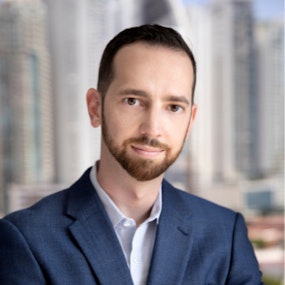
Mikkel Thorup
Expat Consultant
Mikkel has been a previous guest on the show back in early 2020!
______
BIO: Mikkel Thorup is the world’s most sought-after expat consultant. He focuses on helping high-net-worth private clients to legally mitigate tax liabilities, obtain a second residency and citizenship, and assemble a portfolio of foreign investments including international real estate, timber plantations, agricultural land and other hard-money tangible assets.
Mikkel is the Founder and Director at Expat Money™, a private consulting firm started in 2017. He hosts the popular weekly podcast, the Expat Money Show, and wrote the definitive #1-Best Selling book Expat Secrets - How To Pay Zero Taxes, Live Overseas And Make Giant Piles Of Money.
A world traveller since his teens, Mikkel Thorup has learned his craft in three unique and unconventional ways; first, by living it himself, continuously pushing the boundaries testing new ideas around the globe; next, from diligent and intense study consuming over 2000 books and courses on the subject; and finally, by apprenticing and learning directly from the world's top legal experts in the field. Mikkel has dedicated himself for over two decades to building this mountain of knowledge, one that is not constrained by languages, cultures, or borders. He now works one-on-one with private clients utilizing this combination of hard-won experience and in-depth knowledge and has helped hundreds of people to build their dream lives abroad.




























